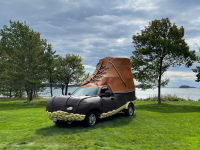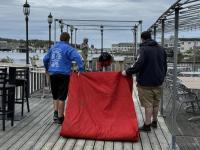Cell tower rejected by appeals board
The Ocean Point skyline will remain towerless, at least for now. On January 28, the Boothbay Board of Appeals denied Mariner Tower a variance to build a 120-foot tall cell tower in East Boothbay.
Mariner Tower’s attorney John Springer made his opening statement at the Boothbay Town Office. Springer told the appeals board that a cell tower would be an essential part of the Ocean Point area in order to cover a “significant coverage gap” in wireless service. Although cell towers are prohibited in the special residential district where the proposed tower would go, Springer said that the 120-foot tower would have a low visual impact on the surrounding area and provide AT&T and other wireless service to the community.
“I think it’s important to keep in mind that although communication towers are not permitted in the special residential district, essential services are,” Springer said, citing a list of communication facilities that the Boothbay ordinances define as “essential services.”
“I will be the first to admit, I don’t think we are an ‘essential service’ as that phrase is defined in the ordinance,” Springer said. “But we are an extremely popular service that people use for essential phone calls all the time.”
Springer and a panel of experts were met with opposition by East Boothbay residents Jean Reese-Gibson and Danielle and Ben Betts. Gibson delivered an impassioned speech stating that the proposed tower site would damage the natural scenery, the local economy and the quality of life on Ocean Point.
The Betts family, whose property abuts the property where the proposed tower would go, presented detailed evidence and animated models of how living next to a tower would drastically alter their personal and professional lives. The Betts said they are not against cell towers, however Mariner Tower and the cellular service providers outlined in this project did not adequately investigate other alternative technologies or locations before approaching the town of Boothbay. Additionally the Betts’ showed charts of the 120-foot “mono-pine” tower, made to look like a tree, which dwarfs the surrounding vegetation by as much 60 feet.
In its decision, the board of appeals found that Mariner Tower did not meet all the criteria defined in the ordinances to be granted a variance. Appeals board member Scott Adams questioned Springer’s use of the term “significant coverage gap.”
“The term ‘significant’ is used in a lot of these court cases,” Adams said. “The question is what is significant? Is significant in the area not covered, or is significant the populace that's not covered in the area? It's a term the courts use, but it hasn’t been addressed here.”
Adams also poked holes in Springer’s argument that there is not enough wireless service available on the peninsula.
“We heard testimony that said wireless service isn't available. It can be available by AT&T through other alternative needs that haven't been fully examined, and perhaps by other wireless tower locations,” Adams said. “I don't think we're effectively prohibiting personal wireless services to be provided for this area. They are already there.”
While the application for a variance has been denied at the local level, Springer said a lawsuit will likely be filed against the town in federal court. According to the town of Boothbay attorney Sally Daggett if the applicant can prove there is a coverage gap that effectively prohibits service, the Federal Communications Commission can find the town in violation, and overturn the board’s decision.
Event Date
Address
839 Ocean Point Road
East Boothbay , ME 04544
United States






















